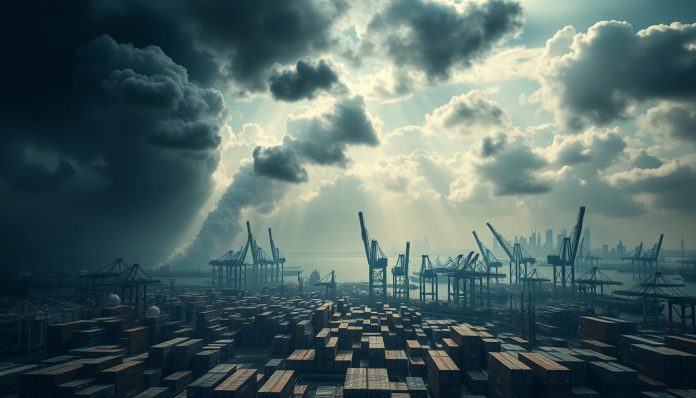The global economy is experiencing a major change in the dynamics of international trade, that have been caused by increasing tariffs, sanctions, and populist policies.
This new age is shaking the foundation of decades-old trade policies that countries have been accustomed to and they will have to reconsider their approaches.
There has been a question mark on whether the world of trade can withstand these these difficult times and the survival of global trade now rests on the balance.
Key Takeaways:
- International trade is being transformed by the emergence of tariffs and sanctions.
- The populist policies are threatening the current trade agreements.
- The countries are being compelled to adjust their trade policies.
- The future of trade in the world is in doubt.
- To overcome these challenges, new trade policies are being adopted.
The New Reality of Global trade:
The global trade is taking a different perspective as tariffs and sanctions continue to become common. The growing use of protectionist policies is also having a huge effect on how nations relate and do business with one another.
The Emergence of Protectionism:
Protectionism which is the imposition of tariffs and other barriers to trade is increasing. This change is motivated by the need by nations to safeguard the local industries and employment. Nevertheless, the effects of protectionist policies may be far-reaching, such as increasing the prices imposed on the consumers and decreasing the competitiveness of the businesses.
Protectionism has a complex impact. On the one hand, it may offer a short-term protection of the domestic industries. Conversely, it might cause counteractions by the rest of the world nations and the whole issue may end up in trade wars.
The Trade Routes being redefined by Sanctions:
The other important issue that is transforming global trade is sanctions. Sanctions are imposed due to various geopolitical reasons and they can have a devastating effect on the capacity of a country to trade internationally. This, by extension, may result into the diversion of trade flows and the development of new trade routes.
Sanctions may have serious economic consequences, not only to the specific country being sanctioned but also to the rest of the world. It has the potential to interfere with supply chains, impact the price of commodities, and overall the trade environment.
This is causing the businesses and countries to make changes by seeking other paths and partners hence reforming the global trade map.
U.S. Role in the Relaxing World Trade:
The strength of American businesses is even being tested with the trade restrictions on the increase. The U.S. has been the proponent of free trade and the current world trade situation is compelling American companies to reevaluate their strategies.
Tariffs and sanctions have caused a big change in the way the U.S. businesses act abroad. The actual direct economic effects of these trade restrictions are not the only aspect that the companies have to contend with since they are also having to be shrewd in walking through a maze of geopolitical tensions.
Economic Effect of trade restrictions to American businesses:
The effect of trade limitations to business in America is economic in nature. On the one hand, the tariffs put on imported goods may increase their prices, which may weaken the demand and impact the profit levels. Conversely, sanctions may also restrict access to some markets where companies are forced to find alternative, and in many cases, more expensive supply chains.
| Impact Area | Description | Potential Effect |
| Tariffs on Imports | Increased cost of imported goods | Reduced demand, lower profit margins |
| Sanctions | Limited access to certain markets | Increased costs due to alternative supply chains |
| Supply Chain Disruptions | Delays and inefficiencies in supply chains | Increased operational costs, potential loss of business |
Adaptation Strategies of the U.S. companies:
To address these issues, U.S. firms are taking some diverse measures to change accordingly. Others are diversifying their supply chains so that they do not rely on one particular market and the others are making investments in technologies that are able to help counter the effect of tariffs and sanctions.
The important adaptation policies are:
- Supply chain risk reduction through diversification.
- Investing in technology to boost efficiency in operations.
- Using diplomacy to reduce trade tension.

As the international business environment keeps on changing, the adaptability of the American businesses will be a key to their success. U.S. companies can overcome this difficult environment by being aware of the effects of trade restrictions and by putting in place effective adaptation strategies.
In conclusion: Discovering Resilience in an Era of Trade Uncertainty:
The international trading environment is experiencing a radical change, which is triggered by the emergence of tariff, sanctions, and populist policies. With the world maneuvering in this new reality, firms and policymakers should come up with mechanisms of creating resilience when dealing with trade uncertainty.
It is essential that companies learn the consequences of global trade policies in order to be able to adjust and succeed. U.S. companies can reduce the risks that trade measures pose through supply chain diversification, market research, and building a flexible business model.
How the organizations navigate the uncertainty in the trade will be determined by the capacity to adapt to the evolving global trade policies. Since the nature of the global trade environment is evolving it will be imperative to instil a culture of resilience and adaptability in business to make it successful.
FAQ:
So what is the effect of tariffs on international trade?
Tariffs may have a significant effect on international trade by raising the price of imported goods that may cause the consumer prices to rise and the demand to decrease. It may also result in counteractions by other nations that would increase trade conflicts.
What is the impact of sanctions on international trade routes?
Sanctions have the potential of ruining international trade routes by limiting the exchange of goods and services across borders. This may cause a change in the flow of trade, with businesses finding alternative routes and suppliers in order to bypass the sanctions.
What is the impact of protectionist policies in the world economy?
The effects of protectionist policies may extend to the international economy with an eventual decline in economic growth, higher prices and less competitiveness. Such policies may also result in trade wars and low levels of international cooperation.
What are American businesses doing to overcome trade restrictions?
The ways in which American businesses are coping with the restrictions on trade have included diversifying their supply chains, new markets and investing in research and development in order to make them more competitive. Other businesses are also lobbying to have the trade policies altered so that the effects of tariffs and sanctions can be mitigated.
Which are the strategies U.S. firms can consider to get through the fluctuating global trade environment?
The U.S. companies can manage in the fluctuating global trade environment by taking care of the developments in trade policies, diversifying their supply chains, and designing contingency plans to overcome the possible risks. They are also able to make investments in market research to detect new opportunities and contacts relationships with key stakeholders.
What can businesses do to be resilient when the future of trade is unpredictable?
Resilience to the uncertainties in trade may be achieved by businesses being agile and adaptable and diversifying their sources of revenues as well as investing in risk management strategies. They can also invest in developing positive relationships with suppliers, customers, and other stakeholders in order to overcome possible disruptions.


